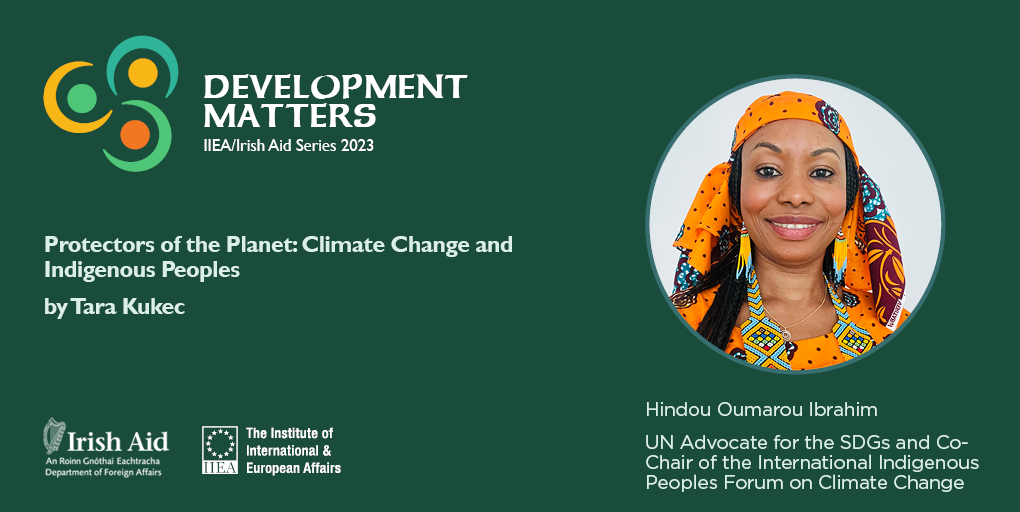Protectors of the Planet: Climate Change and Indigenous Peoples

David Donoghue, former Irish ambassador to the UN and chair of this inaugural lecture in the Development Matters series, introduced Ms Hindou Oumarou Ibrahim, one of 16 advocates for the UN Sustainable Development Goals (SDGs), appointed in 2019 by the United Nations Secretary-General, Mr Antonio Guterres. Ms Ibrahim is a Chadian environmentalist, a geographer, and an expert in Indigenous Peoples’ adaption to climate change and is currently co-chair of the International Indigenous Peoples Forum on Climate Change.
Sinéad Walsh, Climate Director at Irish Aid at the Department of Foreign Affairs, opened the discussion by noting that the Development Matters series, supported by Irish Aid, provides an opportunity for important conversations not just on climate change but on ‘inclusive’ and ‘just’ climate action and environmental protection, specifically focusing on those who can work together to make a change. She emphasized that the climate conversation is not just about science and the weather, which are critical, but about focusing on communities vulnerable to climate change and impacted by it even though they did not cause it. Ms Walshe also referred to the enormous benefits the international community can derive from the wisdom of indigenous peoples.
Ms Walshe said that Ireland’s climate diplomacy and climate finance are focused on reaching targetted communities and ensuring they receive it. Furthermore, she added that a priority for Ireland at COP 27 was involvement in the loss and damage discussions. She is a member of the transitional committee established to operationalise the fund and the funding arrangements for loss and damage. She concluded on a positive note in this regard, pointing out that Ireland is happily in the process of doubling its climate finance by 2025. This funding is focused on locally-led adaptation, gender-responsive activities and reaching the vulnerable communities in the SIDS (small-island-developing States) and the LDCs. Ms Walshe mentioned one geographical exception to the latter group of countries, the Amazon Region, where Irish Aid is working with indigenous communities. Ireland is investing €1 million in organisations such as the Instituto Socioambiental and Fundo Casa Socioambiental, which are fighting against deforestation and environmental degradation and working on better governance and sustainable management of their territories.
The Social Impact of Climate Change
In her speech, entitled Protectors of the Planet: Climate Change and Indigenous Peoples, Ms Oumarou Ibrahim introduced herself as a pastoralist and member of a nomadic community in the fragile region of the Sahel where rainfall and climate change have the most impact, as these communities rely on nature’s resources for food. She began by giving several examples of the social impact of climate change. Firstly, it impacts the economy when communities lose their livestock, or their agriculture is damaged. This leads to internal migration to cities and changes the way of life in rural communities. Secondly, climate change leads to conflict within and between communities as people fight to access natural resources, destroying the previously existing social harmony. A further contributing factor is terrorist groups, such as Boko Haram, who roam around Chad, Mali and Burkina Faso recruiting young men. Ms Ibrahim argued that loss and damage is not just about the economy but also about communities losing their homes, culture and identities. Thirdly, Ms Ibrahim observed that climate change impacts food security and health because if the cattle die, and new foods are introduced as substitutes which are not nutritious, this leads to illness, malnutrition, and a rise in new diseases to the region such as cancer.
Role of the Indigenous Peoples in Protecting the Environment
Ms Ibrahim then outlined the role of Indigenous peoples, who represent 5% of the world’s population and protect a quarter of the planet’s land and 80% of the world’s biodiversity. She highlighted their traditional knowledge about nature, which helps conserve tropical forests, coral reefs in the Caribbean, ecosystems from the Himalayas to the Antarctic, and counter biodiversity loss worldwide.
She emphasised that traditional knowledge of nature and the environment is essential for managing resilience, describing her work in the 2D and 3D mapping of the region around Lake Chad to protect forests, maintain wetlands, map the movement of people and animals, and make a database to help manage shrinking resources. Digital action such as 3D mapping helps mitigate food security and poverty and assists communities in reaching the SDGs of access to water and land.
Indigenous Peoples Remain Uninvited to the Decision-making Process
On governance issues, Ms Ibrahim argued that indigenous peoples are still not at the centre of decision-making. They are seen as victims of climate change with a primarily humanitarian aid response, which she felt is inappropriate, as it is a short-term tool in a crisis situation. She sees the solution in getting all indigenous peoples together with politicians to develop appropriate, sustainable policies for each region.
In conclusion, Ms Ibrahim said that she wanted to develop partnerships with governments and think tanks such as the IIEA, which, she noted, is committed to the dual purpose of sharing ideas and shaping policies. She said that contrary to public opinion, indigenous peoples do not represent the past but are the eco-warriors of today, living in harmony with the species with clear air and clean water. She stated that indigenous peoples want to work with governments and international institutions as financial partners, not as beneficiaries, and play a full role in negotiations. Calling for reform of the international financial architecture, Ms Ibrahim refuted the idea that a financial model designed by the West is helpful or appropriate globally, calling on politicians to listen to the expert views of indigenous peoples and draw on their wisdom on how to combat climate change.
Disclaimer: The ideas, opinions and comments in this blog are entirely the responsibility of its author and do not necessarily represent or reflect Irish Aid policy.
